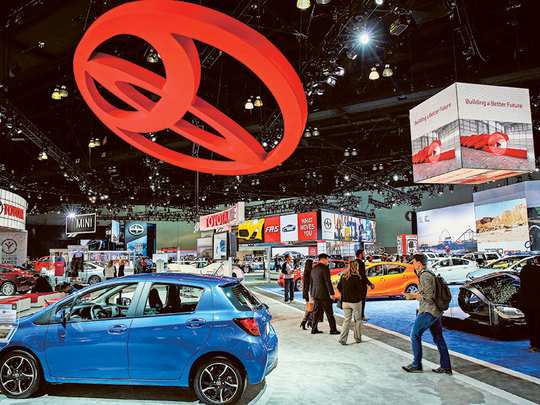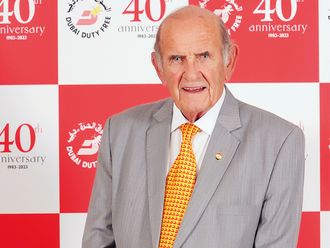
Tokyo: The sub-$100 a barrel oil prices represent the biggest speed-breaker for the Middle East’s automotive sector going into 2015, according to a top official at Toyota Motor Corp and the world’s top car manufacturer.
“The region had performed exceptionally well in the last four years and the $100 plus a barrel price was the condition — actually a very good condition — for that,” said Takayuki Yoshitsugu, Chief Representative for the Middle East and North Africa at the carmaker. “At the prevailing $80 a barrel or thereabouts, it will put growth for the auto industry in slow speed.
“This factor more than the (political/civil) situation in some of the regional territories has the biggest bearing on prospects.”
Despite that, Toyota officials believe there is still a lot happening in the six Gulf markets to provide them with some growth possibilities through 2015 and beyond. For Toyota, the GCC makes up around 90 per cent of the 730,000 plus units that it sells in the Mena territory.
“Carmakers will be focusing even more of their energies on buyers in the Gulf, whether it be through model launches or focused marketing strategies,” said Yoshitsugu. “For Japanese manufacturers in particular, that also means using the soft yen to optimum advantage.”
The yen is edging closer to 120 to the dollar, giving a massive pricing boost for Japanese imports. But for Toyota, the current yen situation puts them in a bit of a bind.
After the 2011 Tsunami that struck Japan, its auto industry had been relying on a widespread manufacturing presence outside of the country to lessen its dependence on any one market for its sourcing needs.
“Also, post the Tsunami, we had a situation where the yen was in the high 80s to the dollar, making Japanese products less competitive against other manufacturers,” said Yoshitsugu. “Since then we had been working on a multi sourcing arrangement for our shipments to individual regions.
“Currently, more than 50 per cent of our volumes to the Middle East are from plants outside of Japan and were we had made massive investments. So, we cannot immediately shift production to plants in Japan because the yen is now much lower.
“But, if we reach maximum plant utilisation rates in these overseas plants, a top priority thereafter would be to add new capacities in Japan and, hopefully, make good use of a favourable currency situation in the future. But it’s not something that can be done short-term.”
As of now, Middle East sales make up 8 per cent of Toyota’s overall volumes, with those in North America leading the way with a 28 per cent share and followed by its own home market with 26 per cent. In the 12 months to March 31, 2014, it produced more than 9.1 billion units. That was enough to confirm it as the top automotive manufacturer and ahead of Volkswagen Group.
But those high production output does create problems of another sort. In the last four years, the carmaker had to go through many recall programmes, including one last month for 1.67 million units and in recent days, of 423,000 plus units of the Lexus model for a potential fuel leak hazard. In fact, few of the major volume manufacturers have been able to get away with not having a recall issue in recent years.
“Being a volume manufacturer makes it more difficult for us to build zero-defect cars at all times ... but the moment we identify a problem we let the customers know and rectify these,” said Yoshitsugu. “We realise perfectly well that it created problems for the brand.
“But the trust in the Toyota name built up over decades ensures that it has not suffered a sharp erosion. In the Middle East, for instance, the feedback we received was that the Toyota badge retained a core set of values and which were intact even post the recalls. This had to do with 60 years of offering what vehicle owners wanted in Middle East markets.”
Of late, there has been no respite from defects related issues for the global automotive industry. There is a US Senate investigation on Japan’s Takata Corp., a supplier of airbags to manufacturers and which have been found to burst and cause fatalities from metal fragments. Takata’s auto manufacturing clients — which include Nissan, Honda and BMW apart from Toyota — have been ordering recalls in the US and elsewhere to try and resolve the issue before it gets out of hand. (Estimates now suggest the global auto industry has had more than 10.5 million recalls in the last five years.) On whether manufactures taking more direct control over all aspects of production could offer a possible way out, Yoshitsugu said: “These days it’s not doable. The industry has to rely on parts suppliers while it continues to focus on designing and building cars that people want and creating the technologies for the future..
“The auto industry is grappling with the many problems arising from recalls and why they are happening. But the industry will get on top of the situation.”












